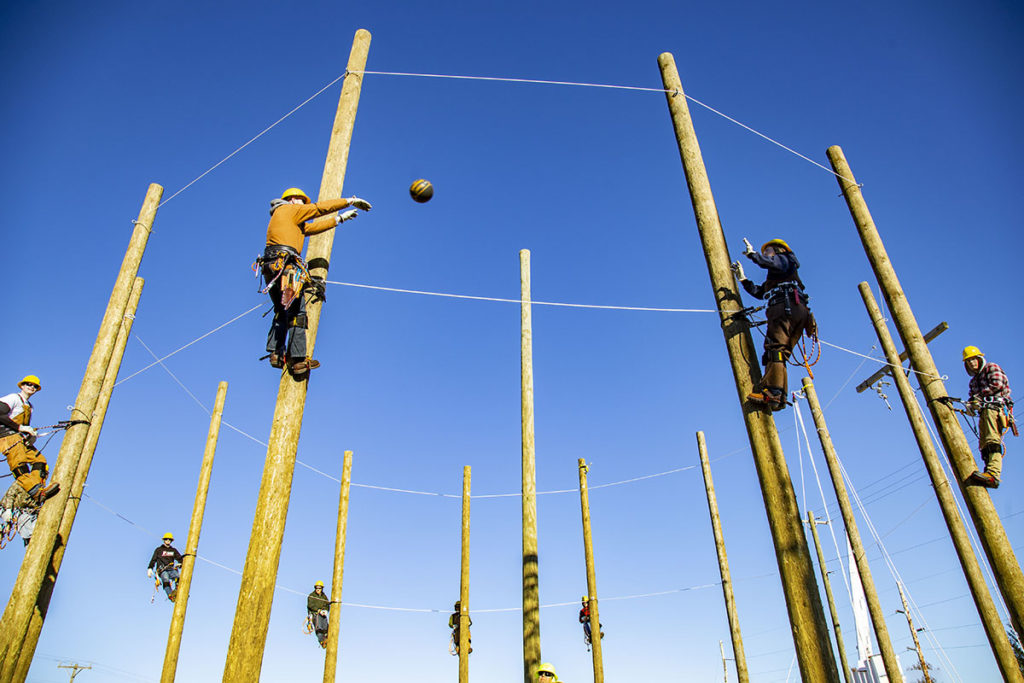
The first time Great Lakes Energy’s T.J. Wodek climbed a pole, “it was scary. I’m not going to lie. Heights don’t bother me; it was more the idea of falling that bothered me.”
But at just 19, the line apprentice at the Boyne City, Michigan-based co-op is now an old hand. “Once you get the hang of it, it’s not too bad,” he said.
Wodek is the co-op’s first straight-from-high-school hire from Energy Fundamentals: Lineworker Emphasis, an award-winning, pre-apprentice vocational education program for juniors and seniors created by Great Lakes Energy and the Charlevoix-Emmet Intermediate School District.
The centerpiece of the program is a training yard designed by the co-op, where students practice a range of tasks under lineworker supervision, including climbing poles, repairing lines and, starting this semester, using drones.
Wodek is one of 35 graduates who’ve completed the nine-month program since it began in 2018; of that group, 10 have continued in a formal linework program.
“I loved the hands-on part of the program and learned a lot of the basics for what an everyday lineman does,” said Wodek, a first-year, “step three” apprentice at the Joint Michigan Apprenticeship Program at Wolverine Power Cooperative, a generation and transmission cooperative in Cadillac.
“I love to be outdoors as much as I can, and you’re doing that 100% of the time as a lineman.”
That mix of real-life and textbook lessons caught the attention of state educators, who recognized the program with a 2021 “Excellence in Practice” for career and technical education, said Jim Rummer, the school district’s regional director of career and technical education.“
“The main obstacles to starting a program like this include facilities and the training—how do you do it? How do you get kids out in the yard and up on poles? And how do we find someone who’s got the skillset” to teach high schoolers, said Rummer. He said a 2017 conversation with Great Lakes Energy CEO Bill Scott about building awareness of utility careers among high schoolers led to the program’s development.
“That’s where Great Lakes Energy stepped up to the plate in more ways than one.”
Two veteran co-op linemen, Scott Yocum and Derek Maki, teach the course. Each week, students attend lectures at Boyne City High School and then get hands-on instruction in a training yard on land leased from Wolverine especially for the program.
“We sat down and created our own curriculum on what we wanted them to experience throughout the year and broke it down into eight review sections and a test for each review,” said Maki, who’s also the assistant director of loss control and training at Great Lakes Energy.
“We don’t want anyone to fail or struggle, so we try to make it easy for them where they still learn and get exposure to the industry,” said Maki, adding that individual grades are awarded on skills components, like hurt-man rescue.
Partnerships with outside groups are essential to making a program like this work, said organizers. Financial support includes $35,000 in pass-through private and public grants from the school district and contributions from two investor-owned utilities, Consumers Energy and DTE. Utility vendors donate tools and equipment.
Students completing the program get credit toward high school graduation, but because employers have their own set of criteria, they will likely need to go to a post-secondary institution or a linework college to advance in a linework career, said Jennifer Wilson, the co-op’s vice president of human resources and loss control.
“The nice thing is that it gives them a glimpse of the industry and whether this is something they actually want to pursue,” said Maki. “And it doesn’t cost them anything.”
And, as Wilson notes, it’s a boon for program’s partners, too.
“Great Lakes Energy and participating utilities and vendors also benefit by building lasting partnerships with students, educators and the community.”
Victoria A. Rocha is a staff writer for NRECA.